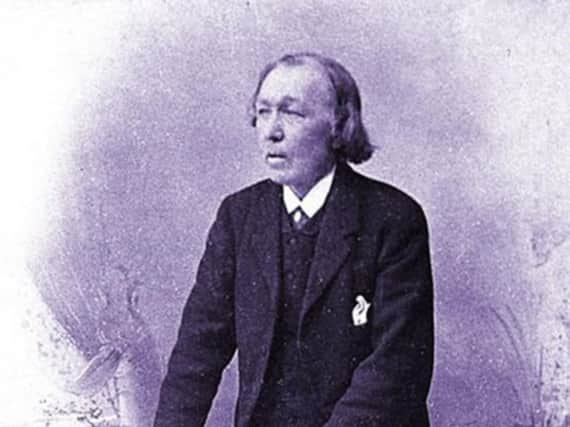Remembering the Scots poet described as the "worst in the world"


Despite the ongoing ridicule he received, many of his books still remain in print. While some critics have encouraged people to buy them just for a laugh, others have claimed McGonagall is actually “an absolutely outstanding primitive poet”.
McGonagall was born in 1825 to Irish parents in Edinburgh with the family moving to Dundee, where father and son both worked as handloom weavers.
Advertisement
Hide AdAdvertisement
Hide AdAs machines gradually took over the work, McGonagall, who died this week in 1902, found potential in the pen.
"I may say Dame Fortune has been very kind to me by endowing me with the genius of poetry," he wrote in his autobiography.
He described the moment he "received the spirit of poetry" while sitting in his back room of his house at Paton's Lane, Dundee, wishing he could go to the Highlands on holiday.
"All of a sudden my body got inflamed, and instantly I was seized with a strong desire to write poetry, so strong, in fact, that in imagination I thought I heard a voice crying in my ears - “WRITE! WRITE”
Beautiful Railway Bridge of the Silvery Tay!
With your numerous arches and pillars in so grand array,
And your central girders, which seem to the eye,
To be almost towering to the sky.
The greatest wonder of the day,
And a great beautification to the River Tay,
Most beautiful to be seen,
Near by Dundee and the Magdalen Green.
It is said that when McGonagall, recited his poems in public 100 years ago, people threw things at him, including bits of fish.
But even when under fire, he did not flinch.
"Gentlemen," he told his audience, "if you please. Don't throw peas."
He was fascinated by becoming a poet to royalty and walked from Dundee to Balmoral via Alyth and the Spittal of Glenshee to present a verse to Queen Victoria.
As chronicled in his autobiography, he claimed at the castle gate that he was the Queen's Poet - it was officially Lord Tennyson at the time - and as a result was not allowed past the porter's lodge.
Advertisement
Hide AdAdvertisement
Hide AdHe persisted and laid siege to the gate before being eventually turned away after being told the Queen could not be bothered to see him.
According to an article in The Stage, McGonagall went on to write commercial verse for two guineas a go.
He supplied Sunlight Soap with the following:
You can use it with great pleasure and ease,
Without wasting any elbow grease.
And when washing the most dirty clothes.
The sweat won't be dripping from your nose."
On delivering this work, he signed off with the following:
"I hope before long, without any joke,
You will require more of my poems about Sunlight Soap.
And in conclusion gentlemen, I thank ye William McGonagall.
Poet, 48 Step Row, Dundee."
McGonagall died in poverty from a brain haemorrhage on September 29, 1902. He was living at South College Street, Edinburgh, at the time and was survived by his widow, Jane.
He published at least 260 poems during his 25-year career with a number of writers working to restore the poet's reputation over time.
In 1968, a play staged at Perth Theatre did a "splending service for the reputation of the Dundee poet and tragedian, William McGonagall, a butt in his lifetime and beyond it for his execrable verse, now shown as a... good it simple man, with the spark of nobility that put him above all his tormentors."
The theatre put on a production of McGonagall's only play, Jack o; the Cudgel, or Hero of a Hundred Fights, for which the writer was offered just 2s 6d.
It was described as an "action packed mini Shakespeare" partly set in Kent with McGonagall writing the lead part for himself.
Alan Bold, the influential poet and biographer, wrote in praise of McGonagall and dismantled his critics.
Advertisement
Hide AdAdvertisement
Hide AdHe said: "The orthodox opinion of McGonagall is that he was a sublimely bad poet: a posturing clown who got the hostility he deserved.
"His name is now a synonym for doggerel and many students seek to establish their intellectual superiority by declaiming his words with suitably knowing smirks.
"McGonagall has been parodied atrociously, has been used as the charismatic man in one-man theatrical shows, has inspired comics like Spike Milligan to attempt to improve on what they think of as blatant badness.
"McGonagall’s achievement has been ridiculed by those who despise his lowly origins and humble verse. The joke, however, is on the anti-McGonallites for McGonagall himself was not really an unforgettably bad poet.
"He was an absolutely outstanding primitive poet."